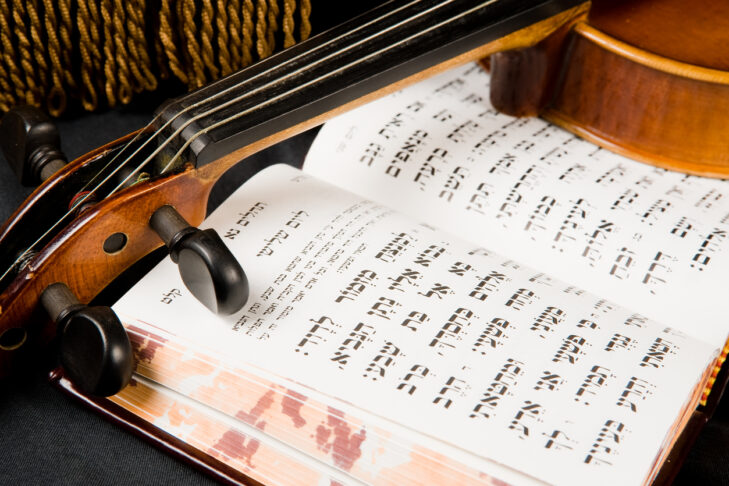In this time of global pandemic and upheaval over racial injustice, religious communities have largely stopped in-person gatherings. But that hasn’t stopped people from seeking hope, inspiration, wisdom and strength from enduring spiritual sources. To meet this need, more than 50 influential spiritual and cultural leaders are launching a major international interfaith initiative, “PsalmSeason: An Online Encounter with the Wisdom of the Psalms.”
The Psalms are a collection of poems in the Hebrew Bible that Jews and Christians (and other seekers) have turned to in times of joy and thanksgiving, as well as sadness and lament. The ancient rabbis; Jesus of Nazareth; Johann Sebastian Bach; Rabbi Nahman of Bratslav; Dr. Martin Luther King Jr.; Fannie Lou Hamer; Elvis Presley; Mother Teresa; and Bono have all engaged this evocative and existentially gripping poetic collection in their quests for meaning and purpose.
Beginning June 8, 2020, PsalmSeason will publish weekly personal reflections, poetry, music and words of inspiration on different psalms that address the feelings of sadness, shock and dislocation from the pandemic and social upheaval. The project will be hosted on Interfaith Youth Core’s Interfaith America website, in partnership with Hebrew College, and will last 18 weeks—the number for “life” in Hebrew.
Contributors represent a range of religious, spiritual and secular traditions and include musicians, artists, poets, storytellers, scholars and activists. Confirmed participants include Krista Tippett (NPR); Father James Martin (America Magazine); Sharon Salzberg (Insight Meditation); Marilyn Nelson (poet laureate in Connecticut); Imam Taymullah Abdur-Rahman (Massachusetts Department of Correction); Dr. Ellen Davis (Duke University); Rev. William Lamar IV (Metropolitan African Methodist Episcopal Church in Washington, D.C.); Sarah Hurwitz (senior White House speechwriter for President Obama); Dr. Aviva Zornberg (author); Dr. Obery Hendricks (Columbia University); Dr. Jerome Groopman (Harvard Medical School); Makoto Fujimura (visual artist); Rev. Otis Moss III (Trinity United Church of Christ in Chicago); Rabbi Sharon Brous (Ikar in Los Angeles); Bishop Gene Robinson (Chautauqua Institute); and Rev. Brian McClaren (author).
- The launch on June 8 will include a concert featuring 18 musical and poetic expressions from around the world, including people of diverse races and religions, including Ireland, Uganda, Israel and the United States. Headliners will include Sweet Honey in the Rock and David Broza. Each performer will share a piece directly from Psalms or inspired by its themes of lament and longing, comfort and strength, and gratitude and hope.
Rabbi Or Rose, director of The Betty Ann Greenbaum Miller Center for Interreligious Learning & Leadership of Hebrew College, envisioned the project and enlisted long-time interfaith colleague Rev. Paul Brandeis Raushenbush, senior advisor at IFYC, to bring the project to life.
“The beauty and ferocity of the Book of Psalms provide us with a rich and time-honored resource through which to reflect on the current crises and our pursuit of justice, compassion and healing,” Rabbi Rose said. “Like so many of the ancient poets in this time-honored text, we seek meaningful ways to express our deepest thoughts and feelings in a time of upheaval.”
“We hope PsalmSeason will offer accompaniment for all who are feeling disconnected, discouraged, degraded or alone,” added Rev. Raushenbush. “Reaching out over the millennia, the Psalms offer us a soundtrack for this time of illness and injustice, reminding us of our intimate connection to the Divine and our divinely mandated commitment to one another.”
In her introduction to the PsalmSeason project, Dr. Ellen Davis of Duke University Divinity School writes about the intimate relevance of the Psalms:
“The Psalms speak directly from and to the human heart. They are ‘an anatomy of the soul,’ as the Christian theologian John Calvin called them nearly five centuries ago, ‘for there is not an emotion of which anyone can be conscious that is not here represented as in a mirror.’ Physical suffering and mental anguish, the desolation of abandonment by friends and by God, terror in the presence of enemies, gratitude for such never-ordinary joys as healthy children and peace among kinfolk, awe at the beauty of the heavens or the fierceness of a storm, quiet confidence in God—all these find vivid expression. The psalmist’s emotion is palpable; the straightforward language draws us in: ‘My tears have been food for me day and night’ (Ps. 42:4); ‘Teach us to number our days’ (Ps. 90:12).”
Never miss the best stories and events! Get JewishBoston This Week.
This post has been contributed by a third party. The opinions, facts and any media content are presented solely by the author, and JewishBoston assumes no responsibility for them. Want to add your voice to the conversation? Publish your own post here.
MORE



